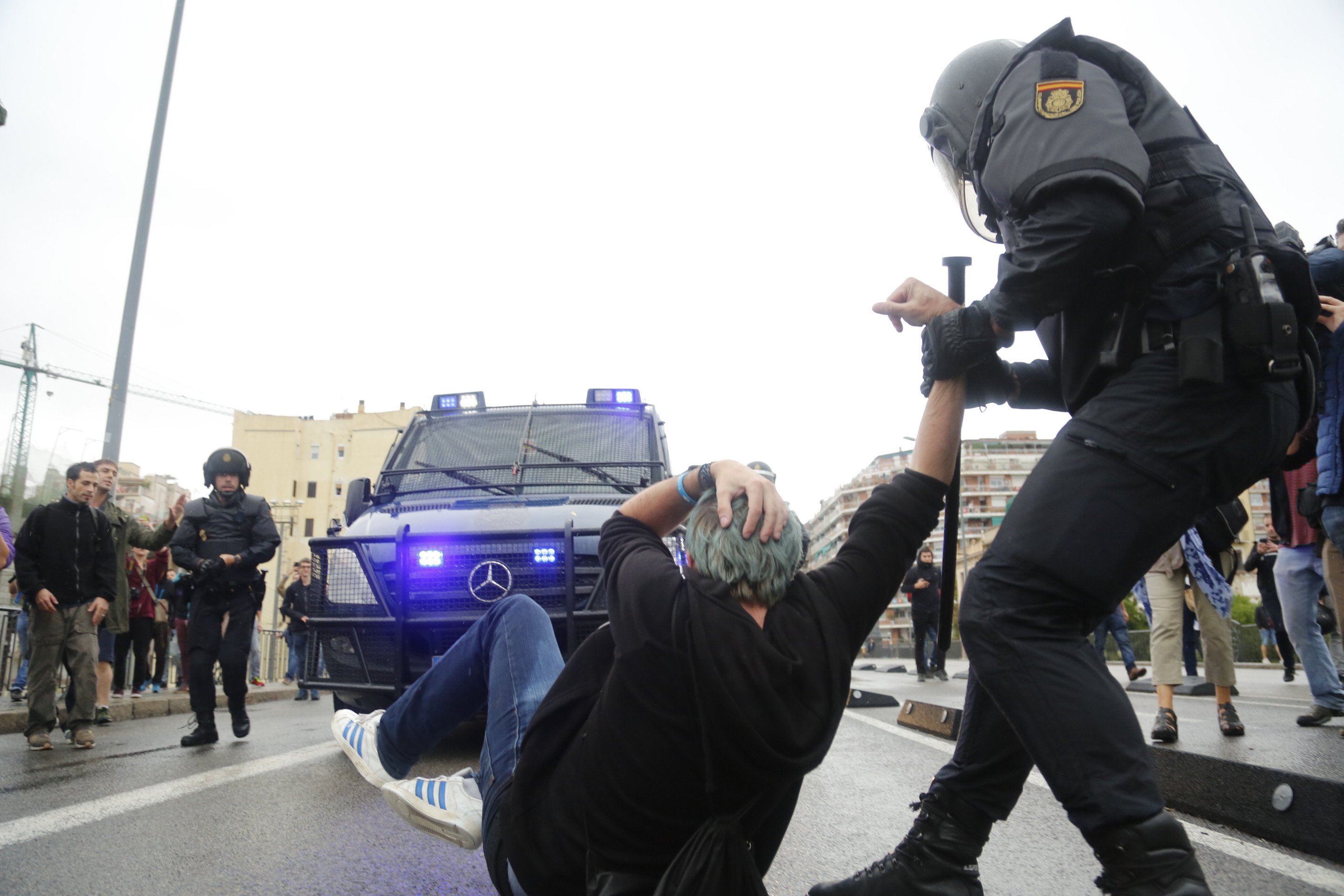The largest union representing Spanish police, JUPOL, has called on their political boss, Spanish interior minister Fernando Grande-Marlaska, to defend the 45 officers being prosecuted by a Barcelona court for what the union says was "doing their job" of trying to prevent the Catalan independence referendum on 1st October 2017. "We demand that the interior minister once and for all comes out in defence of his national policemen and that he stop siding with the seditionists and criminals", JUPOL declared after learning of the prosecution of 45 officers. In a message on the union's Twitter account, the general secretary of the union, appeals to the 45 prosecuted police officers, and offers them a phone number they can call if they need help with their defence. The union describes them as "heroes". The judge, on the other hand, says that their actions could constitute crimes of injury, crimes against moral integrity and even torture.
JUPOL reclama a Marlaska (@interiorgob) que defensi els 45 policies processats per "fer el seu treball|feina" en el referèndum de l'1-O, via @europapress
— JUPOL (@JupolNacional) January 26, 2023
JUPOL posa els seus #ServiciosJurídicos a disposició dels compañeros.#JUPOLcontigo#EquiparacionYa https://t.co/gwOmG19RQ5
Translation of tweet: "JUPOL calls on Marlaska to defend the 45 police officers charged for "doing their job" in the 1-O referendum. JUPOL puts its legal services at the disposition of our colleagues." - JUPOL
����♂️����♂️Por defensar l'ordre constitucional l'1-O hi ha 45 @policia imputats
— AaronRiv_JUPOL (@AaronRiv_JUPOL) January 26, 2023
����Los responsables de tot allò indultat i amb codi penal modificat ad-hoc
✔️Ponemos a disposició de tots els afectats els serveis jurídics de JUPOL#Jupolcontigo#EquiparacionYa pic.twitter.com/DkeyCriQf9
Translation of text in tweet image: "Spain, 2023: 45 Heroes charged versus Seditionists pardoned. We demand that the government once and for all comes out in defence of the National Police and stops taking the side of the seditionists and criminals."
VIDEO: Spanish National Police officers acting against members of the public at the INS Pau Claris, Barcelona, on 1st October 2017.
Appeal to the constitutional order
For its part, a second union, the Sindicat Unificat de Policia (SUP) has accused the Spanish government of "modifying the Penal Code to benefit those who are guilty of an illegal referendum with violence in Catalonia on October 1st". In its Twitter account it says that on October 1st 2017 the police "defended the constitutional order against the radicals". The Confederació Espanyola de Policies (CEP), according to the digital newspaper The Objective, complains that in the case there were also private prosecutions against the officers by "the Generalitat of Catalonia and the Barcelona City Council". "We are not surprised because at the CEP we have been denouncing pro-independence plans for years, which are aimed at eliminating the presence of the National Police in this autonomous community."
Modifiquen el #CódigoPenal per beneficiar als culpables d'un referendum il·legal amb violència en #Cataluña el #1octubre#Policías van defensar el #OrdenConstitucional davant dels radicals
— SUP (@Sup_Policia) January 25, 2023
El SUP manifesta indignació davant del #DesamparoInstitucionalhttps://t.co/0zfmtm97cC
Crimes of injury and even torture
Barcelona investigating court number 7 has concluded the investigation into the actions taken by the Spanish police in Barcelona city on October 1st 2017 against the Catalan independence referendum. More than five years after the events, it has left 45 members of the Spanish National Police corps about to be tried, and shelved the investigations into another 20, in relation to the use of force by police in several school centres in the city, which left dozens injured.
According to the investigating judge, the actions could constitute crimes of injury, crimes against moral integrity and even torture. The Spanish police acted that day in 27 primary and secondary schools in Barcelona, and in all of them there were complaints, but not all of them have been successful. In a long court ruling of 69 pages, the judge examines all the centres where incidents took place one by one. In two of these centres there were no incidents. In other schools there were incidents, but the judge does not see sufficient evidence, especially audiovisual, to assert that the police acted disproportionately, according to the protocols, or alternatively it was not possible to identify the author of the reported events. The judge notes that those gathered could not be assumed to know the judicial order to dislodge the buildings. For this reason, in some of the centres, the judge says that the police action was totally "excessive" in general and protocols were not followed.
So, for example, he explains that in some cases there was no negotiation or warning to the voters gathered there, force was used in a "clearly unnecessary" way towards the assembled people who were "without any aggressive attitude" and with elderly people amongst them. It also describes baton blows, standing and delivering punches to the head and face of voters who had already been dislodged with a "solely injurious purpose", or unnecessary shoving. The centres most affected are the CEIP Mediterrània primary school, in Barceloneta, the INS Pau Claris secondary school, where people were thrown down stairs by officers, and the CEIP Ramon Llull school, with dozens injured.

